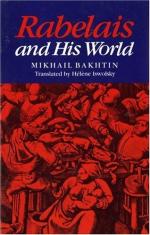
|
| Name: _________________________ | Period: ___________________ |
This test consists of 5 multiple choice questions, 5 short answer questions, and 10 short essay questions.
Multiple Choice Questions
1. According to Bakhtin, what is directly related to the oversized foods common at Renaissance feasts?
(a) Bodily restraint as a result of mind over matter.
(b) The general health of a town's population.
(c) Grotesque portrayals of the stomach, mouth, and genitals.
(d) The swelling of religious fervor during holy days.
2. Rabelais expresses the debasement of suffering and fear by associating them with:
(a) Religious fervor.
(b) Defecation.
(c) Sexual intercourse.
(d) Hunger.
3. What style does Bakhtin find the prologue of _Pantagruel_ to be written in?
(a) It is dark and foreboding.
(b) It is ironic and maliciously exaggerated.
(c) It is innocent and childlike.
(d) It is rhetorical and persuasive.
4. According to Bakhtin's semiotic understanding, what irony is inherent within the creative power of language?
(a) The individual expresses him- or herself only through the words of others.
(b) No word can actually ever be defined.
(c) All languages are one.
(d) Language does not actually express anything.
5. Why does Friar John beat thousands of men in his abbey?
(a) To save the abbey's vineyards.
(b) Another Friar challenged him.
(c) To save France from atheism.
(d) As a show of force to deter invaders.
Short Answer Questions
1. During Bakhtin's time, what genre was being closely defined by the Soviet government?
2. "Friar John" is heavily associated with:
3. What was the reception of Rabelais' work in the eighteenth century?
4. Why was Rabelais linked so closely to the Lyon fairs?
5. What are the "Catchpoles" of which Rabelais writes?
Short Essay Questions
1. Describe the Renaissance student writings.
2. What was the "feast of fools," and why was it a particularly festive laughter in the Middle Ages?
3. Why does the speaker of the prologue of the Third Book invite only good men to drink?
4. What is the underlying nature of all of Rabelais' images?
5. Describe Friar John.
6. How does Bakhtin interpret the prologue of _Pantagruel_?
7. What are the "cris de Paris," or "street cries"?
8. What was Bakhtin's relationship with the Russian Union of Writers?
9. How does Rabelais describe the human body in the context of grotesque realism?
10. Describe the Catchpoles and what they symbolize.
|
This section contains 871 words (approx. 3 pages at 300 words per page) |

|




